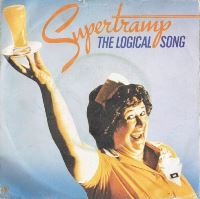 .
.
The first time I heard a Supertramp song was when Give A Little Bit charted in the summer of 1977. I heard it played on the radio and loved the ‘American’ sound to it. Likewise a couple of years later when they released the album Breakfast in America I thought it had a terrific ‘American’ sound. It was only when I started researching that I realised they were English and formed in London. I was stunned.
Also, little did I know that they had formed, originally as a progrock band, back in 1969. Founding member Swindon-born Rick Davies had been in a band called The Joint which had been funded by a wealthy Dutchman but then he felt the band weren’t doing very well and stopped funding them. But the Dutch guy was impressed with Davies’ talent and offered him a chance to form his own band which he then backed. So he brought in singer and bass player Roger Hodgson and a couple of other musicians who didn’t remain for long. By 1973, the more permanent line up featured Dougie Thomson on bass, John Helliwell on keyboard and saxophone and Bob Siebenberg on drums.
Their third, fourth and fifth albums, Crime of the Century (number four in 1974), Crisis? What Crisis? (number 20 in 1975) and Even in the Quietest Moments (number 12 in 1977) respectively were all well received but it was 1979’s Breakfast in America that brought them to a worldwide audience. Even the album sleeve with the waitress holding a tray with a glass of orange juice aloft with a blouse matching the colour of the orange juice and overlooking a New York skyline is iconic and very memorable.
All of their UK hit singles were written jointly between Davies and Hodgson and the first single from Breakfast in America gave them their biggest UK hit, The Logical Song with 19 different rhyming words that end with ‘al’ or ‘le’.
The song is all about growing up. Transforming from a child to an adult and going from an innocent care-free kid to the worries of a pessimistic and sceptical world that we now live in.
Roger Hodgson, who sang lead vocals on the track, once said, “This song is quoted in schools so much. I’ve been told it’s the most-quoted song in school. That may be because it has so many words in it that people like to spell. But I think it also poses that question, and maybe stimulates something with students. I hope so.”
He explained more in a 2012 interview with Songfacts, “I think it was very relevant when I wrote it, and actually I think it’s even more relevant today. It’s very basically saying that what they teach us in schools is all very fine, but what about what they don’t teach us in schools that creates so much confusion in our being. I mean, they don’t really prepare us for life in terms of teaching us who we are on the inside. They teach us how to function on the outside and to be very intellectual, but they don’t tell us how to act with our intuition or our heart or really give us a real plausible explanation of what life’s about. There’s a huge hole in the education. I remember leaving school at 19, I was totally confused. That song really came out of my confusion, which came down to a basic question: please tell me who I am. I felt very lost. I had to educate myself in that way, and that’s why California was very good for me to kind of re-educate myself, if you like.” It’s obviously a subject close to Hodgson’s heart because on Crime of the Century there was a track called School which had very similar sentiments.
The title came about after Hodgson was singing nonsense words whilst playing keyboards to try and get some ideas for real words, “From singing absolute nonsense, a line will pop up that suddenly makes sense, then another one, and so on. I was doing that when the word ‘logical’, came into my head and I thought, ‘That’s an interesting word'”. Once the song was finished, he initially did nothing with it, why? “I had actually finished the words and the arrangement six months before I proposed it to the band for the album – I didn’t think anyone would like it.”
If you listen carefully in the last verse of the song, there’s a bit that goes, ”Cause I was feeling so logical, yeah, D-D-D-D-D-D-D-Digital’ and just after that there is a bleeping sound, which was made by a game machine. In the studio next door to where the band were recording an engineer named Richard Digby-Smith had a Mattel handheld electronic football game and the bleep you hear is the sound made when a player loses the ball to another player. Roger liked that sound and decided to include it which accentuated the word digital. This all happened at a time when digital games were still a long way off.
As much as the song still get a regular airing on many radio stations, in 2002 it was brought to a new audience when the German techno/trance band Scooter covered it and took it two places higher peaking at number two. That band were made up of four members, all of whom were once telesales operators at Edel Records in Hamburg.
In 2004, a tribute band called Logicaltramp were formed of which real band members Roger Hodgson and John Helliwell are in favour the latter of which has actually appeared on stage with them.